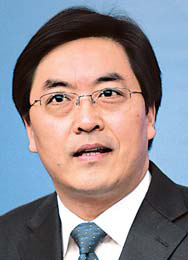Society
Deaths: No link to faulty vaccines
By Shan Juan (China Daily)
Updated: 2010-04-07 07:01
 |
Large Medium Small |
'National safety standards met'
BEIJING - Faulty vaccines did not cause the deaths and illnesses of nearly 100 children in Shanxi province, the Ministry of Health (MOH) said on Tuesday.
Citing the results of a 15-day official investigation, the ministry said the children were never injected with vaccines that were allegedly mishandled.
 Deng Haihua says probe is ongoing into the link between Huawei and Shanxi provincial health department. [Zhang Wei/China Daily] |
Only three of the children suffered adverse reactions to the vaccines they received, Deng said.
"Local health authorities will compensate them for their suffering, even though some children's conditions were not related to vaccine quality," he said.
The father of one of the children surnamed Wang told China Daily he was not contacted for any compensation for his son's death. Wang said he still believed faulty vaccines killed his son.
On March 17, the Beijing-based China Economic Times reported that nearly 100 children died or fell ill after receiving improperly stored vaccines supplied by the Beijing Huawei Company, who had a monopoly on vaccine distribution and supply after allegedly bribing health officials. The report cited Chen Tao'an, a whistleblower who worked with the Shanxi center for disease control and prevention in 2007.
"Vaccines in the province including those supplied by Huawei, as investigations showed, were all up to national standards in terms of safety and efficacy," Deng said.
But he conceded that the company violated State regulations by attaching labels to vaccine packages without approval and storing them without refrigeration.
| ||||
The records also included diagnoses by local hospitals, said Yu Jingjin, deputy director of the ministry's disease prevention and control bureau.
Still, a number of healthcare professionals expressed doubts over the inspection results.
Li Tiantian, a doctor at the Peking Union Medical College, said an investigation conducted years after the children first showed symptoms following immunization would hardly provide sound, scientific proof on whether their conditions were related to vaccines.
But while it is generally accepted that inadequate storage of vaccines can lead to a decrease in their effectiveness, such practice does not have an impact on safety such as the appearance of side effects, said K. Lisa Cairns, immunization expert with the World Health Organization Beijing office.
Yu admitted that loopholes remain in the current regulation of vaccines.
"The ministry is working on better alternatives," he said.
Currently, the government purchases certain vaccines for compulsory vaccinations and provides them free to the public. But some other vaccines are optional and must be paid for by individuals. Any qualified vaccine manufacturer such as Huawei can supply the products with the approval of health departments at provincial levels.
But Huawei claimed to be an MOH subsidiary and provided compulsory vaccines in Shanxi from January 2006 to September 2007, breaching State regulations, Deng said.
Investigations into the link between the company and the Shanxi provincial health department are ongoing, he said.











